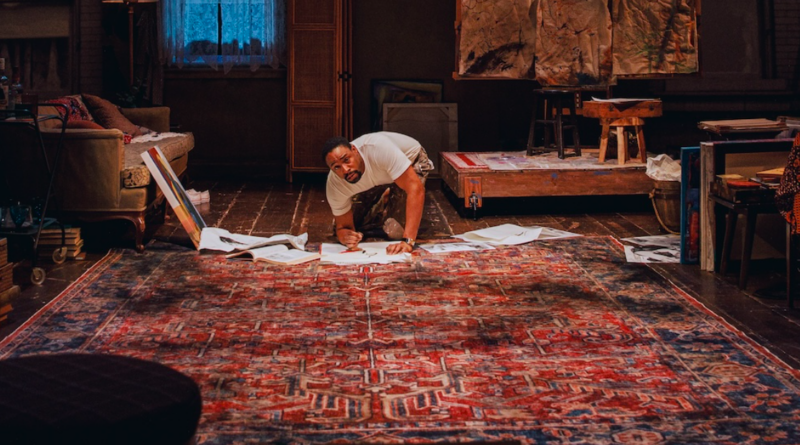INTERVIEW: ‘Wine in the Wilderness’ hits home for modern audiences
Photo: Wine in the Wilderness stars Grantham Coleman as the artist Bill Jameson. Photo courtesy of Marc J. Franklin / Provided by official site.
Classic Stage Company is currently producing a rare work by the legendary playwright Alice Childress, who was born in 1916 and raised during the Harlem Renaissance. But one of the main actors of the piece has a profound question: Why is this work so rarely produced?
Wine in the Wilderness, directed by LaChanze, continues its extended run through Saturday, April 19. The show follows the character of Bill Jameson (Grantham Coleman), an artist who is nearly finished with a triptych centered on Black womanhood, according to press notes. For the final piece of his project, he meets the model Tomorrow “Tommy” Marie (Olivia Washington), and the two learn from each other vital lessons about the role of the artist and muse.
Wine in the Wilderness is set in 1960s Harlem, but to Coleman, a veteran of Broadway and off-Broadway, the plays feels of the minute and resonant for today’s society.
“I have heard about Childress, but sadly going to one of the better schools in the country and going to a performing-arts high school and performing-arts middle school, I had never really seen her work outside seeing Trouble in Mind a couple years ago on Broadway,” Coleman said, referencing the Broadway production of Childress’ best-known work, which starred this production’s director, LaChanze. “So I had a friend that was the associate director of the show, and I know that they had been trying to do this play for like two years. And I knew that LaChanze was going to direct it, and I helped a friend audition for the role of Tommy, like last year at some point. Nothing came around of that, and I was like, ‘Hold on. This seems like a good part.’ And then all of a sudden an offer came, and I jumped at it. The play is phenomenal. It’s rarely done for some reason that we can’t really figure out aside from the fact that it’s a show about Black people for Black people about a very critical time in Black history in America.”
Speaking of his specific part in the show, Coleman said it’s a good thing that he doesn’t have much in common with his character of Bill. The actor sees the artist he’s portraying as prescriptive, while Coleman likes to think of himself as reflective.
“I think the job of an actor is to reflect humanity to themselves, be it the nice and beautiful parts or the ugly parts, which I do think Bill has a lot of ugly in him,” he said. “My job is to be the vessel, to tell the truth of this person, whereas I feel like Bill as an artist wants to paint the world as it should be, wants to paint the world to empower his people, but while judging his people, basically telling them this is what you should be, this is what you should do, rather than reflecting the beautifulness of who they actually are.”
In a word, the play is about revolution, and Coleman sees Bill going through a revolution as well. Along the way, he learns many important lessons, courtesy of the character of Tomorrow. She is profound, full of deep feeling and caring.
“And that is where an artist should start from, from being an actual caring person,” Coleman said. “He’s been lost in his own little artistic world. I don’t know if he ever estimated her, but he surely knows her worth by the end of the story.”
The backdrop to the play is the ongoing civil rights movement. Coleman has studied this time period, and he’s actually explored the important era in previous theatrical work.
“I spent quite a lot of time in the ‘60s with a lot of my past projects, like The Great Society, which was a Broadway show where I played Martin Luther King,” he said. “Also from my own growing up and doing the research about the civil rights movement, I had a lot to draw on. The unique thing about this was how Harlem-centric it is and how it is inspired by true events. The Harlem riots in 1964 were sparked because a young Black man was killed by a police officer, which seems like it’s ripped from the headlines of today. … Also, I played Bobby Seale, who was one of the founding members of the Black Panther Party, so I’ve definitely been in the ‘60s a lot of my work. I have a well of info to draw on and influence who Bill Jameson is.”
How Childress’ poetic and earth-shattering words still resonate today is what impresses Coleman the most about Wine in the Wilderness. This play is about a historical time period, but it feels like it could have been written yesterday.
“I talk to so many people in the talkbacks and after the show,” the actor said. “They go … ‘When did she write it? Is this from five years ago? 10 years ago?’ We’re like, ‘No, this play is from 1969.’ This is a play when people were still feeling the effects of fighting the civil rights fight, and I think it’s still relevant today because so many people are still fighting their fight in their own ways. We’re still seeing a huge gap in terms of where we thought we’d be and what we’re fighting for, so I think the revolution of her words definitely hits home to a modern audience.”
By John Soltes / Publisher / John@HollywoodSoapbox.com
Wine in the Wilderness, starring Grantham Coleman, continues through Saturday, April 19, at Classic Stage Company in New York City. Click here for more information and tickets.

